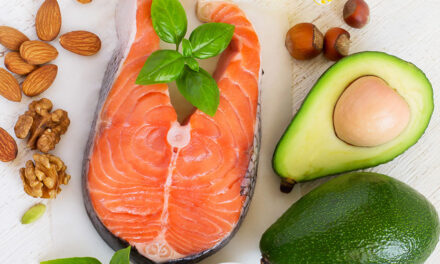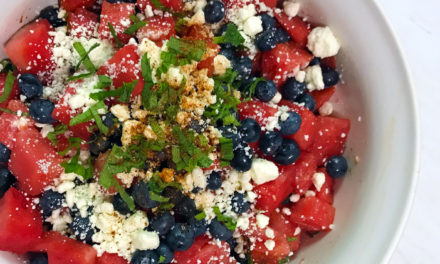If you are pregnant or thinking about becoming pregnant, read through the following information to discover which nutrients are most important for a healthy pregnancy.
DHA
DHA is a specific type of omega-3 fatty acid, and it is especially important in pregnancy, as it is essential for fetal brain and eye development. Sources of DHA include low mercury fish (such as salmon and herring) and eggs (specifically egg yolks). During pregnancy, it is recommended that consumption of fish be limited to twice weekly. For those who do not consume fish (or eat it rarely), Algae Omega by Nordic Naturals is just one supplement that provides both DHA and EPA (another type of omega-3 fatty acid). Consider companies that require third-party testing to ensure label accuracy and overall quality. Pregnant women should aim for a minimum of 200 mg of DHA per day from food and/or supplements.1 It is recommended that the supplementation you are considering be discussed with your doctor.
Folic Acid
Folate (also known as vitamin B9) refers to the naturally-occurring form of the vitamin, and folic acid is found in fortified foods and many dietary supplements. When a woman is pregnant, her folate needs are higher than normal, and it can be difficult to meet these demands through diet alone. Supplementing with 400 mg daily2 of folic acid (from supplements, fortified foods, or both) can help in meeting the total recommended intake of 600 mg daily while pregnant. Sources of folate include spinach, black-eyed peas, asparagus, rice, avocado, broccoli, and oranges. Adequate intake of folate and/or folic acid reduces the risk for neural tube defects.
Choline
Choline is another nutrient that helps to reduce the risk for neural tube defects. In general, we need choline to help regulate memory, mood, and muscle control. Choline is found in egg yolk, chicken, beef, soybeans, potatoes, and quinoa. It is recommended that pregnant women consume 450 mg daily.3
Choosing a Prenatal Vitamin
Some things to look for in a prenatal vitamin include 350–450 mg choline, L-5-MTHF (the universally metabolized and biologically active form of folate), methylcobalamin (a highly bioavailable form of vitamin B12), vitamin D, and iron. Consider your pre-pregnancy iron levels before deciding on the right prenatal vitamin for you, as the amount of iron in prenatal vitamins vary. With pregnancy, a woman’s daily iron needs increase from 18 mg to 27 mg. Take a look at the vitamin A provided in prenatal supplements as well. The majority should be from beta-carotene, not vitamin A acetate, retinol, or palmitate. This is because an excess of the preformed variety of vitamin A may increase the chances of birth defects.2 A prenatal vitamin can help prevent certain nutrient deficiencies, but it is important to consume healthful, balanced meals full of nutrients and fiber.
Balance and Variety
Balance and variety are the keys to adequate nutrition during pregnancy. While pregnancy does require more calories, having these calories come from nutrient-rich sources, like fruits, vegetables, whole grains, and protein will allow for an overall healthier pregnancy. A variety of foods will provide a variety of nutrients that can help prevent certain birth defects as well as reduce pregnancy symptoms, like nausea and constipation. Aim to consume a balance of fiber, protein, and healthy fat at each meal and snack. This won’t always look perfect, but the more frequently balanced meals are consumed, the greater the likelihood of adequate consumption of a variety of nutrients the body needs. Remember, fiber comes from fruits, vegetables, whole grains, nuts and seeds, and legumes. Protein can be from animal sources like eggs, fish, chicken, and turkey. Plant foods such as beans, nuts, whole grains, and soybeans also provide protein. Healthy fat sources include walnuts, salmon, herring, eggs, avocado, chia seeds, and ground flaxseed. Lastly, hydration during pregnancy is important for forming amniotic fluid, building new tissue, and increasing energy. A minimum of 8–12 cups per day is recommended.
If you have further questions or would like more guidance on eating healthy during pregnancy, reach out to Kristi Edwards and Erin Dragutsky of 901 Nutrition, LLC., by emailing [email protected].
References:
- Tempest, Megan. Ensuring the Health of Expectant Mother and Baby. Today’s Dietitian. 2011 December. Available at: https://www.todaysdietitian.com/newarchives/121311p30.shtml. Accessed April 2021.
- Ward, Elizabeth. Prime the Body for Pregnancy – Preconception Care and Nutrition for Moms-to-Be. Today’s Dietitian. 2008 December. Available at: https://www.todaysdietitian.com/newarchives/120108p26.shtml. Accessed April 2021.
- Choline: Fact Sheet for Health Professionals. National Institutes of Health. 2021 March. Available at: https://ods.od.nih.gov/factsheets/Choline-HealthProfessional/. Accessed April 2021.
- Cruz, Lupe. How Hydration During Pregnancy Can Help You and Your Baby. Intermountain Healthcare. 2017 July. Available at: https://intermountainhealthcare.org/blogs/topics/live-well/2017/07/how-hydration-during-pregnancy-can-benefit-you-and-your-baby/. Accessed April 2021
Kristi Edwards, co-founder and owner of 901 Nutrition LLC, is a licensed and registered dietitian in Memphis. She has several years of experience in both acute care and outpatient settings, and she is passionate about helping clients ditch dieting for good, through intuitive eating and the enjoyment of food. You can reach Kristi at 901.800.9526 or [email protected]. To learn more about 901 Nutrition or to subscribe to their free newsletter for monthly recipe books, visit 901nutrition.com. You can also follow 901 Nutrition on Facebook, Instagram, Twitter, and LinkedIn.







